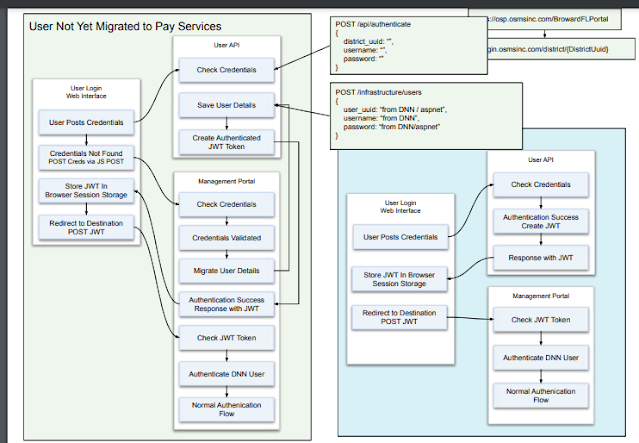Asp.Net Core Identity With MultiTenant
dotnet ef migrations add UserNameUniqueFalse --context UsersContext
dotnet ef database update --context UsersContext
-----------
dotnet-ef migrations add First --project IdentityDemo1
dotnet-ef database update --project IdentityDemo1
----------
Continue
https://stackoverflow.com/questions/50786399/override-validateasync-in-uservalidator-cs-for-net-core-identity-2-1
services.AddIdentity<ApplicationUser, IdentityRole>()
.AddEntityFrameworkStores<ApplicationDbContext>()
.AddUserManager<CustomUserManager<ApplicationUser>>()
And finally inject this class
services.AddTransient<ICustomUserValidator<ApplicationUser>, CustomUserValidator<ApplicationUser>>();
First let me explain the problem
The reason is why the Identity library injects the validate user class that uses the default library, which is UserValidator.
The solution is only to inject a CustomUserValidator. What happens is that if it is injected into the normal implementation, what it does is that it adds 2 UserValidator, the first is the default by the identity library and the second would be the one that you implemented the CustomUserIdentity.
Then to inject only the CustomUserIdentity you must create a new CustomUserManager to be able to inject the new ICustomUserValidator so that it does not take the one that is by default IUserValidator.
This is my solution:
This is the interface ICustomUserValidator
public interface ICustomUserValidator<TUser> : IUserValidator<TUser> where TUser : ApplicationUser
{
}
And the implementation of the class
public class CustomUserValidator<TUser> : UserValidator<TUser>, ICustomUserValidator<TUser>
where TUser : ApplicationUser
{
public async Task<IdentityResult> ValidateAsync(UserManager<TUser> manager, TUser user)
{
//Some Code
}
private async Task ValidateUserName(UserManager<TUser> manager, TUser user, ICollection<IdentityError> errors)
{
//Some Code
}
}
And this one for the CustomUserManager
public class CustomUserManager<TUser> : UserManager<TUser>
where TUser : ApplicationUser
{
public CustomUserManager(IUserStore<TUser> store, IOptions<IdentityOptions> optionsAccessor,
IPasswordHasher<TUser> passwordHasher, IEnumerable<ICustomUserValidator<TUser>> userValidators,
IEnumerable<IPasswordValidator<TUser>> passwordValidators, ILookupNormalizer keyNormalizer,
IdentityErrorDescriber errors, IServiceProvider tokenProviders,
ILogger<UserManager<TUser>> logger)
: base(
store, optionsAccessor, passwordHasher, userValidators, passwordValidators, keyNormalizer, errors,
tokenProviders, logger)
{
}
}
Notice that instead of IUserValidator, I put ICustomUserValidator
In the Startup class you have to inject the new class:
services.AddIdentity<ApplicationUser, IdentityRole>()
.AddEntityFrameworkStores<ApplicationDbContext>()
.AddUserManager<CustomUserManager<ApplicationUser>>()
And finally inject this class
services.AddTransient<ICustomUserValidator<ApplicationUser>, CustomUserValidator
There may be only 2 option
createasync
validate method
we will try to override or extend that
--------------------------------
https://thecodeblogger.com/2020/01/23/adding-asp-net-core-identity-to-web-api-project/
enable-migrations -ContextTypeName
https://stackoverflow.com/a/47635205/8641086
https://andrewlock.net/creating-custom-password-validators-for-asp-net-core-identity-2/
looks like we've implement UserValidator and need to setup with startup.cs
and in applicationdbcontext class need to do some changes
* EF Core uses a metadata model to describe how the application's entity types are mapped to the underlying database
User Claims
A set of statements (or Claims) about the user that represent the user's identity. Can enable greater expression of the user's identity than can be achieved through roles.
There may be only 2 option
createasync
validate method
we will try to override or extend that
UserManager<TUser> -- > CreateAsync
https://stackoverflow.com/questions/29094063/how-to-allow-user-to-register-with-duplicate-username-using-identity-framework-1
- IUserStore
The IUserStore<TUser> interface is the only interface you must implement in the user store. It defines methods for creating, updating, deleting, and retrieving users.
---------------------------
IdentityDemo with Sql
D:\Practice Projects\@Core\IdentityDemo1
References
https://medium.com/@zahidcakici/multitenancy-and-finbukcle-in-net-f1d5e7e5f1bf
https://learn.microsoft.com/en-us/dotnet/api/microsoft.aspnetcore.identity.iuserstore-1.createasync?view=aspnetcore-7.0#microsoft-aspnetcore-identity-iuserstore-1-createasync(-0-system-threading-cancellationtoken)
custom-identity-columns-in-aspdotnet-core
https://www.freecodespot.com/blog/custom-identity-columns-in-aspdotnet-core/
change the migration file if table name was changed
- first change the migration file as require then run update - database command
dotnet ef migrations add IdentityDbUser --context UsersContext
dotnet ef database update --context UsersContext
to store 2 username in identity & extra column
https://www.scottbrady91.com/aspnet-identity/quick-and-easy-aspnet-identity-multitenancy
Proj - D:\Practice Projects\@Core\IdentityDemo1
dotnet-ef migrations add First --project IdentityDemo1
dotnet-ef database update --project IdentityDemo1
https://docs.google.com/spreadsheets/d/1idbCiBQkWugFwKJFNi8W0llEd-uZeIUcZma9f5XtT_g/edit#gid=1161891927
Register flow in identity
To Debug
Stop IIs
Debug option from vscode
Existing DB authentication in osp management portal
select top 1 * from [dbo].[aspnet_Applications]
ApplicationName
LoweredApplicationName
ApplicationId
Description
select top 1 * from [dbo].[Users]
UserID
Username
FirstName
LastName
IsSuperUser
AffiliateId
DisplayName
UpdatePassword
select top 1 * from [dbo].[aspnet_Users]
ApplicationId
UserId
Password
PasswordFormat
PasswordSalt
MobilePIN
LoweredEmail
PasswordQuestion
PasswordAnswer
IsApproved
IsLockedOut
CreateDate
LastLoginDate
LastPasswordChangedDate
LastLockoutDate
FailedPasswordAttemptCount
FailedPasswordAttemptWindowStart
FailedPasswordAnswerAttemptCount
FailedPasswordAnswerAttemptWindowStart
Comment
select top 1 * from [dbo].[aspnet_Membership]
ApplicationId
UserId
Password
PasswordFormat
PasswordSalt
MobilePIN
LoweredEmail
PasswordQuestion
PasswordAnswer
IsApproved
IsLockedOut
CreateDate
LastLoginDate
LastPasswordChangedDate
LastLockoutDate
FailedPasswordAttemptCount
FailedPasswordAttemptWindowStart
FailedPasswordAnswerAttemptCount
FailedPasswordAnswerAttemptWindowStart
Comment
select top 1 * from [dbo].[Roles]
RoleID
PortalID
RoleName
Description
ServiceFee
BillingFrequency
TrialPeriod
TrialFrequency
BillingPeriod
TrialFee
IsPublic
AutoAssignment
RoleGroupID
RSVPCode
IconFile
select top 1 * from [dbo].[UserRoles]
UserRoleID
UserID
RoleID
ExpiryDate
IsTrialUsed
EffectiveDate
--assigned list of schools







Comments
Post a Comment